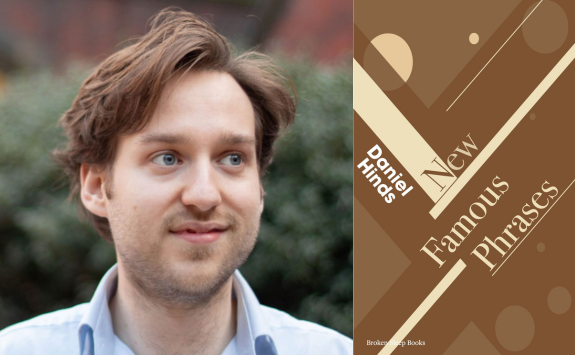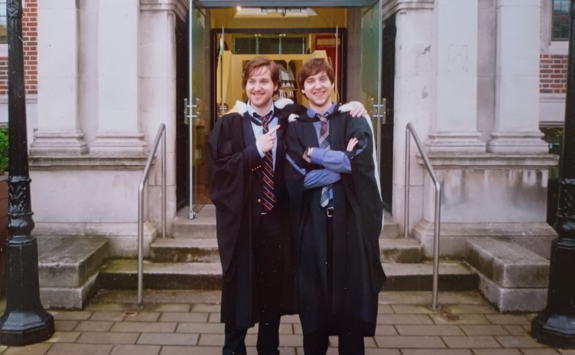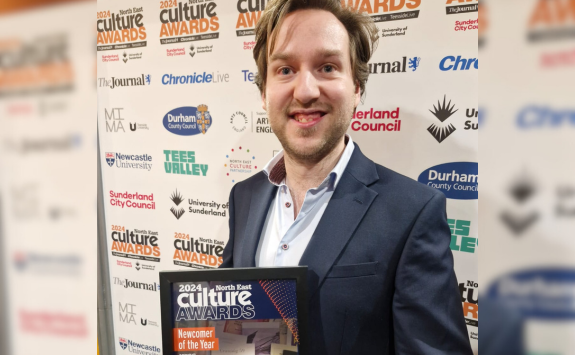National Poetry Day: Meet the Newcastle wordsmith responding to the canon in his debut poetry collection
New Famous Phrases was written by Newcastle University graduate Daniel Hinds (BA Hons English Literature, 2014; MA English Literature, 2015) and explores ancient mythologies, aquatic fables and the evolving art of poetry itself.
2 October 2025
Since graduating from Newcastle University’s School of English Language, Literature and Linguistics in 2015, Daniel has made a name for himself in the local and national poetry community. He is a BBC New Creative and a New Writing North poet, won the Poetry Society’s Timothy Corsellis Young Critics Prize in 2018 and was a North East Culture Award ‘Newcomer of the Year’ finalist last year.
His poetry has been published in The London Magazine, The New European, Wild Court, Poetry Salzburg Review, Stand and Southword to name a few, and in March 2025, he celebrated the publication of his debut collection of poems, entitled New Famous Phrases.
We caught up with Daniel to hear more about the inspiration behind the collection and how his time on campus shaped his writing.

Hi Daniel, thanks for speaking to us! Can you start by telling us how you came to study at Newcastle University?
I grew up just down the road in Whickham, Gateshead, and always loved reading as a kid – so studying English Literature at Newcastle was a no-brainer! I arrived on campus with vague aspirations of becoming an author, mainly because I loved reading so much, but it was my experience in the School of English that inspired me to try my hand at poetry.
I remember on my very first day on campus, Professor Bill Herbert performed a funny poem about the rain, and so poetry was part of my experience from the very beginning. There are so many celebrated poets in the university community – like Bill, Sinéad Morrissey, Sean O’Brien and John Challis – so it always felt like a place that supported and celebrated poetry.
What drew you to poetry during your studies, and what was your first experience writing poetry like?
The opportunity to read and analyse more poetry during my undergraduate degree was what originally piqued my interest and made me start thinking about writing poetry instead of prose. I really enjoyed the close reading of a poem: how much meaning you could extract from just two lines!
In my first year, we did a module called Transformations where we looked at translations and modern retellings of classics, like Ted Hughes’ Tales from Ovid. I remember when I picked up that book, knowing it was going to be important. And reading it, it wasn’t a million miles away from the kind of stuff I wanted to write. I kind of view Ted Hughes as my poetic forebearer: there are more epigraphs from Ted Hughes than anyone else in the collection.
I started attending events on campus run by the Newcastle Centre for Literary Arts (NCLA) – mainly because it gained me extra credit for my degree – but I’m still going to them today and no one’s giving me extra credit anymore! Those events got me hooked and introduced me to the local poetry community. NCLA ran a competition while I was a student, so I tried my hand at writing poetry and to my surprise, they published them! It was the first time I’d attempted to write poetry since I was maybe 10 years old, and so it gave me the confidence to continue to write and pursue it.
I arrived on campus with vague aspirations of becoming an author, mainly because I loved reading so much, but it was my experience in the School of English that inspired me to try my hand at poetry.
How is your writing now shaped by your time on campus?
I was looking through my collection, New Famous Phrases, ahead of this conversation and it struck me how many poems published in there exist because of my experiences at Newcastle University. One of the aspects of New Famous Phrases is responding to literary tradition, so there are a lot of epigraphs responding to authors that I first read as part of modules on campus: poets like Tennyson, Keats, T. S. Eliot, H.D., Wordsworth, Mary Shelley…the list goes on!
Having an awareness of the literary canon and tradition, gained from my studies on campus, I think often sets my writing apart. It’s also why I capitalise the beginning of every line!
As well as responding to poets I was introduced to through my studies, there’s one poem in the collection that’s inspired by a trip I took to the Lake District during my Master’s with a group of friends. It’s called ‘The Guide to the Stones’ and it honours our trip to Dove Cottage (former home of William Wordsworth and his sister Dorothy Wordsworth) which really was the foundation for our friendship group.
It’s so lovely to hear that you’re still friends with peers from your student days. What are the standout memories from your time on campus?
My family had moved to Gosforth by the time I was applying to university, so I never got the Halls of Residence experience that many remember, but I loved every minute of my time on campus – so much so that I still work at the university now!
Alongside my course and attending NCLA events, I was involved in the student newspaper The Courier, writing reviews of plays and that kind of thing. We would socialise at the Hancock pub over the road from campus, often after a day in the library. My twin brother (who also studied English at Newcastle) discovered a hack to borrow unlimited books from the library, which came in very handy!
My Master’s dissertation was on Arthur O’Shaughnessy, who is famous for his poem ‘Ode’: “We are the music makers, and we are the dreamers of dreams…”. Those lines have been quoted by US Presidents, he coined the phrase “movers and shakers”, but all his other poetry is pretty much forgotten. I looked at some of that forgotten poetry, specifically around marble and statues, which then inspired an audio piece (The Stone Men of Newcastle) I produced for the BBC New Creative programme about the monuments we have in Newcastle.
That audio show was really timely, as I submitted the idea just before the Edward Colston statue toppled in Bristol. It included the George and the Dragon statue in Old Eldon Square, Anthony Gormley’s ‘Clasp’ on campus, the Mercutio statue in the Theatre Royal, the war memorial at Haymarket, and others, and looked at who we represent in statues and who we should represent in the future.


We’ve touched on it a bit already, but can you tell us more about New Famous Phrases, your debut collection of poetry which was published earlier this year?
I was really excited to have my first collection published in March 2025 with Broken Sleep Books. New Famous Phrases brings together poems and responses to poems I’ve written over the years, traversing ancient mythologies, aquatic fables and how we engage with the literary canon. They’re not modern retellings per se, but my take on these myths and stories that permeate our culture.
Alongside responses to poets I encountered as a student, there are also a few ekphrastic poems responding to paintings in the Laing Art Gallery in Newcastle, which I visited as a student to complement my modules in Victorian literature.
What’s the poetry scene like in Newcastle today?
Newcastle has always been a welcoming community for world-leading poets. You can be in a little room above a pub and be listening to one of the best poets of today reading to 15 people – we’re very lucky!
After graduating, I got involved with New Writing North who support local budding writers with growing a network, development sessions around marketing and contracts and the career paths we can take. We also meet up every month and read our latest work to each other to get feedback. It’s a lovely group to be a part of and lots of the members are fellow Newcastle alumni.
I find writing for publication quite a big motivator, so don’t be afraid to respond to call outs for an anthology or magazine.
And finally, what advice would you give to budding writers in our alumni and student community?
I find writing for publication quite a big motivator, so don’t be afraid to respond to call outs for an anthology or magazine. I found it surprisingly easy to start getting poems published here and there, and that grows your confidence as well as opens doors to other opportunities. Publishers will say that previous success in publishing isn’t required, but it does kind of give you the stamp of approval.
The editorial notes you get back from magazines can also help hone your craft – for me, it meant the poems in New Famous Phrases didn’t really need many amends because I’d already been through the process! I remember once an editor coming back to me, though, saying “oh, this bit doesn’t quite rhyme – is it meant to?” and I had to laugh because in my North East accent, it definitely rhymes!
The research skills I gained during my time at university have been invaluable in quickly sizing up a magazine and working out whether it’s worth submitting to them, or the systematic thinking required to apply for lots of opportunities at once. I have a big spreadsheet of poems I’ve performed at readings, where I’ve had things published, and that really helps when applying for schemes rather than scrambling for information. The long and short of it is, go for it!
New Famous Phrases is available to buy now. Keep up to date with Daniel’s latest work and performances by following him on X or Bluesky.
Do you have news to share with our alumni community?
Get in touch and share your latest news and achievements so we can let your fellow Newcastle alumni know!
